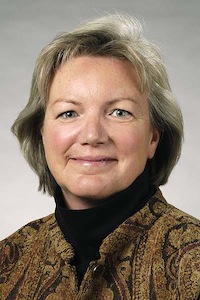Roberts to add year as Pharmacy dean
MADISON — Jeanette Roberts has agreed to remain dean of the University of Wisconsin–Madison School of Pharmacy into 2014, adding to 10 years of successful leadership of one of the oldest and most highly regarded schools in the field.

Jeanette Roberts
Last week, Provost Paul DeLuca Jr. informed the committee charged with finding Roberts’ successor that, despite a strong slate of candidates, the university would start the search anew in the fall.
DeLuca and interim Chancellor David Ward consulted with incoming Chancellor Rebecca Blank over the search. They decided to ask Roberts to stay on in the school’s administration until the university finds the next dean. Happily, DeLuca says, Roberts agreed.
“The School of Pharmacy has flourished during Jeanette’s tenure, rising in rankings and consistently producing exciting research results,” says DeLuca. “We are extremely grateful she is willing to continue serving as dean.”
Roberts, who came to UW–Madison from the University of Utah in 2003, has guided the school to a Top 5 ranking from U.S. News — ahead of Ohio State University and the University of Michigan — and to the World Education Congress’ choice as Best Educational Institute in Pharmacy.
“I am honored that I was asked to continue on as dean, and I look forward to another year to work with the assessment requirements that have helped us align the school’s work and goals,” Roberts says.
Roberts, who has stressed the benefits of joint research projects, is also looking forward to the opportunity to launch a center for inter-professional education in the next year.
A collaboration with the campus’ health sciences schools, education and law schools, and the College of Letters & Science, the center would add to training for all students headed to clinical practices.
“Specialists working together to deliver the best possible care is how health care is provided these days,” Roberts says. “The better we can prepare our graduates to work in those teams, the more effective they — and our health care system — will be.”
